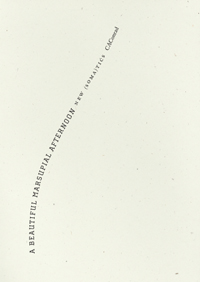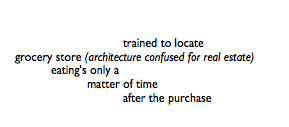 A Beautiful Marsupial Afternoon – New (Soma)tics
A Beautiful Marsupial Afternoon – New (Soma)tics
by CA Conrad
Wave Books, April 2012
240 pages / $18 Buy from Wave Books or SPD
From The Right To Manifest Manifesto:
Suddenly is a speed – in as much as it awakens us to see a constancy we’ve stepped out from. This is in large part what I suppose we all look for in literature or art of any sort. Conrad’s book is something sudden – however not in the sense of a sudden rush of fear or panic or power or adrenaline or lust. It’s more of the suddenness we feel in finding wind – or sensing even ourselves as sudden, to a tree or some thing. The subtlety of this sort of suddenness is residual and it goes along with you and for things. I like to think the book gives a newness to that which one has assumed to be known, or figured.
Conrad’s book is sinuous too. Each Somatic exercise is on a black page with white font, each poem, having been written in response to an exercise, is on a white page in black font. The modality is soothing, but keeps you thinking for polarities – in negations/negatives, as that of a photograph.
You also see the exercise make the poem. The blossom bursts forth from the bud, etc. Every poem has a clear source, its exercise, but also its person, its subject, its time, space, language. In this way, there is a cycle, fluidity, & freedom that is the life of the book.
Here:
“Sit outside under shelter of a doorway, pavilion, or umbrella on a park bench, but somewhere outside where you can easily touch, smell, taste, FEEL the storm. Lean your face into the weather, face pointed UP to the sky, stay there for a bit with eyes closed while water fills the wells of your eyes. Come back into the shelter properly baptized in the beauty of pure elements and be quiet and still for a few minutes. Take some preliminary notes about your surroundings. Try not to engage with others who might run to your shelter for cover. If they insist on talking MOVE somewhere else; you are a poet with a storm to digest, this isn’t time for small talk! You are not running from the storm, you are opening to it, you are IN IT! Stick a bare arm or foot into the storm, let your skin take in a meditative measure of wind and rain. If you are someone who RAN from storms in the past take time to examine the joys of the experience. Remind yourself you are a human being who is approximately 80 percent water SO WHAT’S THE HARM OF A FEW DROPS ON THE OUTSIDE?! Right? YES! Pause, hold your breath for a count of 4, then write with a FURY and without thinking, just let it FLOW OUT OF YOU, write, write, WRITE!Set an empty cup in the storm, hold a slice of bread in the storm. Then put a little salt and a little pepper on your storm soaked bread, maybe some oregano and garlic. With deliberate SLOOOWNESS chew your storm bread and drink the storm captured in your cup. Slowly. So, slowly, please, with, a, slowness, that, is, foreign, to, you. THINK the whole slow time of chewing and drinking how this water has been in a cycle for MILLIONS OF YEARS, falling to earth, quenching horses, elephants, lizards, dinosaurs, humans. They pissed, they died, their water evaporated and gathered again into clouds to drizzle down AND STORM DOWN into rivers, puddles, aqueducts, and ancient cupped hands.
Humans who loved, who are long dead, humans who thieved, raped, murdered, were generous, playful, disappointed, fearful, annoyed and adored one another, each of them dying in their own way, their water going back to the sky, coming back down to your bread, your lips, your stomach, to feed your sinew, your brain, your living, beautiful day. Take your notes POET, IT IS YOUR MOMENT to be totally aware, completely awake!”
That was Somatic Exercise 5 Storm SOAKED Bread. I won’t show you the poem for it.
Here is a poem from Somatic Exercise 12, Tapping Flesh for Sap. The poem is called Leaf Pressed in On My Way by Eileen Myles. I won’t show you the exercise for it.
Here:

I left the above excerpts apart from their counterparts in the book to show that every poem may stand on its own from its exercise. Likewise, every exercise is in its own right left well enough alone from its poem. In this way, the exercises work much like exercises found in a school workbook. The page-spreads themselves – large – invite notation and marginalia and your own ghostly demarcations; a way to work through thoughts as opposed to just being presented with them. With this, the exercises should ask nothing more from you than to experience an outside of routine for your own work, thinking, and feeling.
It’s a book for people, I should say. Everyone can be found and find in it. When I go through the work, I like to think of Conrad as more of a guide than an author. He’s there working with you and for you. I like that – it’s a caring there. It made me happy.
With the book, I find myself aware of my rituals; I use them, “do” them, alienate them by analyzing them, and then embrace them, but after these filters. How odd it is to fall, or to carry something – there are many ways, as well –
***
Tom Trudgeon is a poet. Some of his publishable work has been featured in Out of Nothing, Shampoo, Horse Less Review, Vertebrae, and others. He has a small chapbook, ‘having been spoken w.’, through Avantacular Press. He is also co-editor of Dear Memo Magazine, a small arts and poetics fanzine run out of Los Angeles and Brooklyn.
Tags: Beautiful Marsupial Afternoon, ca conrad, Tom Trudgeon
